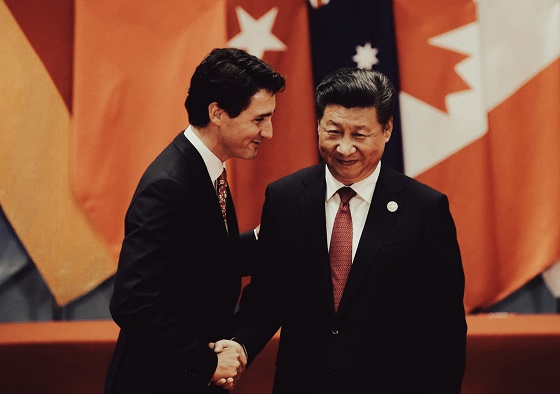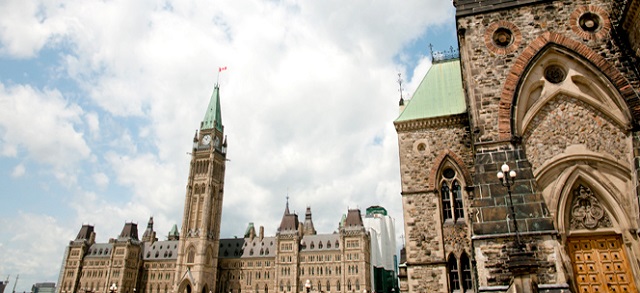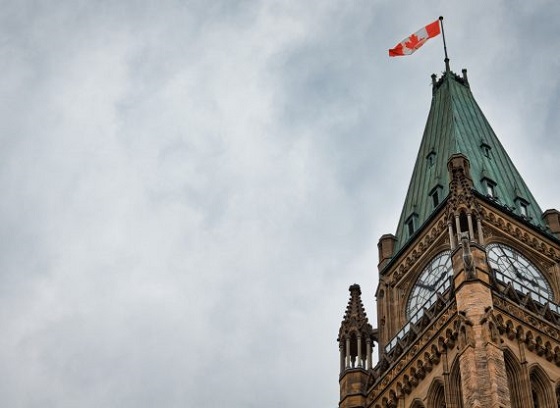espionage
Scathing Report Reveals How Deadly Pathogens and Sensitive Research Walked Out the Door Under Justin Trudeau’s Watch

And here’s the ultimate shock: Dr. Qiu and Mr. Cheng were not arrested or detained. They were not prosecuted for espionage or national security violations. Instead, under the watchful eye of Justin Trudeau’s government, they were allowed to simply leave.
Imagine for a moment that Canada’s top research lab, handling the most dangerous pathogens in the world—Ebola, Henipah, you name it—was left wide open to foreign actors. Not just any foreign actors, but researchers with direct links to the Chinese Communist Party, its military, and its notorious Thousand Talents Program, which is designed to poach foreign research for China’s own strategic and military gain. It sounds like something out of a bad spy thriller, right? But it’s not fiction; it’s happening in Canada, and no one in Ottawa seemed interested in sounding the alarm.
As detailed in the newly released Interim Report of the Special Committee on the Canada–People’s Republic of China Relationship, titled The Nexus Between Science and National Security in Canada: The Case of the National Microbiology Laboratory in Winnipeg, what we’re seeing is an astonishing lapse in oversight and a clear failure by the Canadian government to protect its own assets. Under the chairmanship of Ken Hardie, this committee has exposed one of the most significant threats to Canada’s national security in recent years. And yet, it’s clear from Ottawa’s inaction that they’re more concerned about diplomacy than defending the integrity of Canada’s scientific research.
Here’s the story: Dr. Xiangguo Qiu and her husband Keding Cheng, both highly placed researchers at Canada’s National Microbiology Laboratory (NML) in Winnipeg, were discovered to have sent live samples of deadly pathogens to the Wuhan Institute of Virology. Yes, you heard that right—the same lab in China where U.S. officials raised concerns about safety standards, the same lab with ties to China’s military bio-defense programs. The duo apparently facilitated the transfer of these dangerous viruses, without ever informing their Canadian superiors of their deep, undisclosed ties to the Chinese Academy of Military Medical Sciences. And instead of acting immediately, Canada’s Public Health Agency dragged its feet for nearly 18 months, leaving these individuals with full access to our country’s most secure lab until they were finally escorted out.
The kicker? Dr. Qiu was not only tied to China’s state-run labs; she was a part of China’s Thousand Talents Program, an initiative infamous for recruiting scientists to advance Chinese military and technological aims abroad. The intelligence community has been ringing the bell on this program for years, pointing out that it’s often used to extract intellectual property and cutting-edge technology from unsuspecting Western institutions. Yet, for years, our own government allowed researchers with links to this very program to operate freely inside our lab, handling the kinds of materials that could cause a pandemic.
So what did Ottawa do in response to all of this? They waited. The government sat on its hands, allowing these researchers to continue their work, their connections to China notwithstanding. When the red flags became impossible to ignore, what did Ottawa do? They spent another year “investigating” before finally revoking their security clearances and escorting them out of the lab. Incredibly, these two were essentially free to operate, with minimal oversight, until they were finally fired. No public condemnation, no mention of betrayal. Just a quiet, bureaucratic exit.
And here’s the ultimate shock: Dr. Qiu and Mr. Cheng were not arrested or detained. They were not prosecuted for espionage or national security violations. Instead, under the watchful eye of Justin Trudeau’s government, they were allowed to simply leave. The RCMP concluded an investigation but chose not to charge them, despite clear evidence of security breaches, undisclosed foreign affiliations, and access to sensitive biological data. Now, these individuals are reportedly back in China, free to use the knowledge they gained at the NML in any way they—or their government—sees fit. This is what happens when national security is treated as an afterthought.
Think about the stakes here. These scientists facilitated the transfer of live, deadly virus samples—Ebola and Henipah, no less—to the Wuhan Institute of Virology, a lab linked to China’s bio-defense ambitions. Had any of these samples been mishandled or compromised during transit, we could have seen an epidemic that would make COVID look like a mild cough. And yet, Ottawa’s response? They let them leave the country, free to take that sensitive information and those deadly pathogens with them.
This isn’t just a case of two rogue scientists. It’s a textbook example of Ottawa’s endless naivety when it comes to China—a government so desperate to avoid rocking the diplomatic boat that it overlooked the most basic principles of national security. And while Canadian leadership dithers, China’s influence operations continue to infiltrate our most secure facilities, capitalizing on our open doors and blind trust. This isn’t about science—it’s about sovereignty. And if Canada’s leaders are too timid to confront the truth about foreign interference, it’s the rest of us who will suffer the consequences.
In any other country, this would have been treated as a scandal of epic proportions. But here in Canada, under Trudeau’s watch, we not only allowed suspected national security threats to operate in a top-level lab, but we gave them the green light to walk away and take their knowledge straight to a foreign power. This report is a wake-up call, but whether Ottawa will finally act to protect Canada’s interests remains to be seen.
The report spells out these security lapses in brutal detail. Not only was cybersecurity alarmingly lax, but access protocols were so outdated that foreign entities had unregulated access to sensitive research and biological materials. This wasn’t just a mishap; this was a failure of leadership on every level, starting at the top. The government’s own Canadian Security Intelligence Service (CSIS) had flagged China’s intent to poach scientific research for years. And yet, they ignored that, allowing China, a known aggressor in intellectual property theft, to waltz in and access sensitive data with minimal checks.
Then there’s the espionage risk. It’s clear that China has been targeting Canada’s scientific research for its own military development. This is not speculation; it’s reality. China’s Thousand Talents Program, which the report scrutinizes, is essentially a recruitment and resource-gathering initiative. It encourages Chinese researchers to siphon scientific advancements from abroad and bring them home—not for the betterment of the world, but for China’s military ambitions. The report finally calls this out as a threat, recommending that Canada sever research partnerships with Chinese institutions in high-stakes fields like artificial intelligence, biotechnology, and quantum science.
But here’s the kicker—the recommendations themselves. They make sense, of course. Canada desperately needs to beef up its lab security and stop outsourcing critical research to hostile nations. The report outlines several sensible measures: enhanced security protocols, regular cybersecurity assessments, and yes, a hard stop on partnerships with Chinese research entities in sensitive areas. But what’s troubling is that it took this long and this much incompetence for these ideas to even make it to paper.
Let’s be clear: updating national security policies shouldn’t be a new idea, yet we learn from this report that Canada’s policies haven’t seen a significant update since 2004. Think about that—back then, the world had barely even heard of Facebook. Since then, we’ve entered an era where China has risen as a global tech superpower, yet Ottawa has done next to nothing to adapt. We’re only now beginning to take steps that would have been considered basic precautions a decade ago.
Another recommendation—the establishment of a “List of Trusted Countries”—highlights just how overdue these changes are. The committee suggests that research access should be limited to trusted allies. It’s a painfully obvious measure, but one the government has been too naïve or complacent to enact. We’re talking about limiting sensitive access to allies, not adversaries—a straightforward move that apparently requires a parliamentary committee to remind the government to consider.
So, here’s the good news buried in this report: finally, someone in Ottawa acknowledges that foreign actors, and particularly China, pose a real threat to Canada’s scientific integrity and national security. The recommendations to update policies, bolster security measures, and increase oversight are crucial first steps to protecting Canadian interests. We finally have a report that states the obvious: Canada’s national labs are vulnerable, and it’s about time we stop treating foreign research partners as benign collaborators.
But the real story here isn’t in the recommendations themselves—it’s in what this report reveals about Canada’s persistent, dangerous naivety. The Canadian government allowed this exposure to go on for years, despite clear signs that Chinese actors were exploiting our openness. And the delays! Eighteen months passed between the initial security breach and the firing of these researchers. That delay isn’t just bureaucratic; it’s reckless. The report also conveniently dances around calling China a direct adversary. This soft language is a transparent attempt to avoid upsetting the diplomatic apple cart, even as the Chinese Communist Party plunders Canadian resources right under our noses.
By failing to designate the NML as a facility of national security interest, Ottawa has, in essence, downplayed the real risks tied to foreign interference. This is a lab that deals with viruses capable of sparking pandemics, and yet, our government didn’t even think to prioritize its protection until foreign espionage scandals blew up in public view.
This report is a reality check, but it’s also an indictment. It reveals that Canada’s leaders have been asleep at the wheel while China set its sights on our labs, our technology, and our national interests. Yes, it’s a step forward—but the fact that it took this level of security failure and foreign interference for Ottawa to even begin addressing these issues is a damning testament to their refusal to confront the truth about China.
And here’s the real kicker: nothing in this report guarantees that these recommendations will be enforced. Without the political will to label China as the strategic adversary it is, all of this could end up as little more than lip service. Meanwhile, we had traitors who betrayed Canada, exposing sensitive research to a foreign power—and what did Justin Trudeau do? He let them walk. No charges, no accountability—just a quiet “thanks for coming.” Once again, it will be Canadians—not the bureaucrats in Ottawa—who pay the price for this government’s cowardice.
If Justin Trudeau can’t stand up to China, then it’s time we find a leader who can.
espionage
U.S. Charges Three More Chinese Scholars in Wuhan Bio-Smuggling Case, Citing Pattern of Foreign Exploitation in American Research Labs

Federal prosecutors allege visiting researchers at the University of Michigan’s “Xu Lab” conspired to import undeclared biological materials from Wuhan.
Federal prosecutors have charged three additional Chinese research scholars connected to the so-called “Xu Lab” at the University of Michigan with conspiring to smuggle biological materials from Wuhan and making false statements — the latest in a string of national security cases involving suspicious research activity at the university’s Life Sciences Institute.
Named in a newly filed criminal complaint are Xu Bai, 28, and Fengfan Zhang, 27, who face conspiracy counts, and Zhiyong Zhang, 30, who is accused of making false statements. All three held student exchange visas and worked in the lab of Xianzhong “Shawn” Xu, according to the Justice Department. Chengxuan Han, a Chinese citizen who also worked in Xu’s lab, previously pleaded no contest in the related roundworm smuggling case.
According to the complaint, in 2024 and 2025 Bai and Fengfan Zhang received multiple shipments containing concealed biological materials related to roundworms that had been sent from China by Han, a doctoral student at Huazhong University of Science and Technology in Wuhan. The case accelerated when Han traveled to work in the Xu Lab in June 2025. She was questioned at the border and allegedly evaded searches by wiping her phone and concealing biological material.
“At some point, pattern becomes practice. And, apparently, these three men are part of a long and alarming pattern of criminal activities committed by Chinese nationals under the cover of the University of Michigan,” U.S. Attorney Jerome F. Gorgon Jr. said. “This is a threat to our collective security.”
As the Federal Bureau of Investigation counterintelligence case takes shape, the alleged facts resemble a much more serious episode that occurred before the COVID-19 pandemic at Canada’s most secure pathogen research lab in Winnipeg. In that case, according to Canadian intelligence reports, Chinese international students working under Chinese Canadian scientist Xiangguo Qiu were found to be clandestinely importing and exporting biological materials and secretly using the high-security facility for research connected to People’s Liberation Army biological weapons and vaccine programs, including Ebola and bat filovirus studies at the Wuhan Institute of Virology.
Earlier this year, the Justice Department accused two other China-linked researchers, Zunyong Liu and Yunqing Jian, of smuggling Fusarium graminearum — a crop pathogen cited in scientific literature as a potential agricultural terror agent — into the United States for University of Michigan-related research. Their communications referenced shipping biological materials and research plans. Both face smuggling and related charges.
In the new Michigan case, prosecutors allege multiple packages of concealed biological material related to nematode roundworms were shipped from China in 2024 and 2025 by a doctoral student in Wuhan and received by University of Michigan-affiliated scholars. The Justice Department says Han, the prior shipper, pleaded no contest to smuggling and false statement charges this summer before being removed from the United States.
After Han’s removal and an internal university probe into the Xu Lab, the three defendants were terminated for refusing to attend a mandatory meeting, according to the indictment. Investigators say the men then bought tickets to leave from Detroit on Oct. 20, rebooked for Oct. 15, and ultimately attempted to fly out of John F. Kennedy International Airport at 2 a.m. on Oct. 16. During a customs inspection, one defendant allegedly made false statements about Han, while two others admitted receiving packages from her, including after her arrest.
Shawn Xu, who runs the X.Z. Shawn Xu Laboratory, is not charged. From Ann Arbor, Michigan Live reported that federal investigators have not searched Xu, according to his attorney David Nacht.
Xu “has lived in the United States for decades,” Nacht told Michigan Live, adding that Xu studies worms sourced domestically that are not used for commercial purposes.
In the earlier case, Han admitted sending concealed biological materials to University of Michigan recipients. Although the materials were not considered harmful, prosecutors said the shipments violated import and labeling laws.
A Justice Department press release attributed sharp warnings to senior officials about the misuse of academic pathways. “Educational institutions must enhance their admissions procedures to prevent exploitation,” an acting Immigration and Customs Enforcement director said.
“The Chinese nationals charged allegedly were involved in smuggling biological materials into the U.S. on several occasions,” FBI director Kash Patel said. “The FBI and our partners are committed to defending the homeland and stopping any illegal smuggling into our country.”
The Bureau is a reader-supported publication.
To receive new posts and support my work, consider becoming a free or paid subscriber.
Censorship Industrial Complex
How the UK and Canada Are Leading the West’s Descent into Digital Authoritarianism

“Big Brother is watching you.” These chilling words from George Orwell’s dystopian masterpiece, 1984, no longer read as fiction but are becoming a bleak reality in the UK and Canada—where digital dystopian measures are unravelling the fabric of freedom in two of the West’s oldest democracies.
Under the guise of safety and innovation, the UK and Canada are deploying invasive tools that undermine privacy, stifle free expression, and foster a culture of self-censorship. Both nations are exporting their digital control frameworks through the Five Eyes alliance, a covert intelligence-sharing network uniting the UK, Canada, US, Australia, and New Zealand, established during the Cold War. Simultaneously, their alignment with the United Nations’ Agenda 2030, particularly Sustainable Development Goal (SDG) 16.9—which mandates universal legal identity by 2030—supports a global policy for digital IDs, such as the UK’s proposed Brit Card and Canada’s Digital Identity Program, which funnel personal data into centralized systems under the pretext of “efficiency and inclusion.” By championing expansive digital regulations, such as the UK’s Online Safety Act and Canada’s pending Bill C-8, which prioritize state-defined “safety” over individual liberties, both nations are not just embracing digital authoritarianism—they’re accelerating the West’s descent into it.
The UK’s digital dragnet
The United Kingdom has long positioned itself as a global leader in surveillance. The British spy agency, Government Communications Headquarters (GCHQ), runs the formerly-secret mass surveillance programme, code-named Tempora, operational since 2011, which intercepts and stores vast amounts of global internet and phone traffic by tapping into transatlantic fibre-optic cables. Knowledge of its existence only came about in 2013, thanks to the bombshell documents leaked by the former National Security Agency (NSA) intelligence contractor and whistleblower, Edward Snowden. “It’s not just a US problem. The UK has a huge dog in this fight,” Snowden told the Guardian in a June 2013 report. “They [GCHQ] are worse than the US.”
Following that, is the Investigatory Powers Act (IPA) 2016, also dubbed the “Snooper’s Charter,” which mandates that internet service providers store users’ browsing histories, emails, texts, and phone calls for up to a year. Government agencies, including police and intelligence services (like MI5, MI6, and GCHQ) can access this data without a warrant in many cases, enabling bulk collection of communications metadata. This has been criticized for enabling mass surveillance on a scale that invades everyday privacy.
Recent expansions under the Online Safety Act (OSA) further empower authorities to demand backdoors in encrypted apps like WhatsApp, potentially scanning private messages for vaguely defined “harmful” content—a move critics like Big Brother Watch, a privacy advocacy group, decry as a gateway to mass surveillance. The OSA, which received Royal Assent on October 26, 2023, represents a sprawling piece of legislation by the UK government to regulate online content and “protect” users, particularly children, from “illegal and harmful material.” Implemented in phases by Ofcom, the UK’s communications watchdog, it imposes duties on a vast array of internet services, including social media, search engines, messaging apps, gaming platforms, and sites with user-generated content forcing compliance through risk assessments and hefty fines. By July 2025, the OSA was considered “fully in force” for most major provisions. This sweeping regime, aligned with global surveillance trends via Agenda 2030’s push for digital control, threatens to entrench a state-sanctioned digital dragnet, prioritizing “safety” over fundamental freedoms.
Elon Musk’s platform X has warned that the act risks “seriously infringing” on free speech, with the threat of fines up to £18 million or 10% of global annual turnover for non-compliance, encouraging platforms to censor legitimate content to avoid punishment. Musk took to X to express his personal view on the act’s true purpose: “suppression of the people.”

In late September, Imgur (an image-hosting platform popular for memes and shared media) made the decision to block UK users rather than comply with the OSA’s stringent regulations. This underscores the chilling effect such laws can have on digital freedom.
The act’s stated purpose is to make the UK “the safest place in the world to be online.” However, critics argue it’s a brazen power grab by the UK government to increase censorship and surveillance, all the while masquerading as a noble crusade to “protect” users.
Another pivotal development is the Data (Use and Access) Act 2025 (DUAA), which received Royal Assent in June. This wide-ranging legislation streamlines data protection rules to boost economic growth and public services but at the cost of privacy safeguards. It allows broader data sharing among government agencies and private entities, including for AI-driven analytics. For instance, it enables “smart data schemes” where personal information from banking, energy, and telecom sectors can be accessed more easily, seemingly for consumer benefits like personalized services—but raising fears of unchecked profiling.
Cybersecurity enhancements further expand the UK’s pervasive surveillance measures. The forthcoming Cyber Security and Resilience Bill, announced in the July 2024 King’s Speech and slated for introduction by year’s end, expands the Network and Information Systems (NIS) Regulations to critical infrastructure, mandating real-time threat reporting and government access to systems. This builds on existing tools like facial recognition technology, deployed extensively in public spaces. In 2025, trials in cities like London have integrated AI cameras that scan crowds in real-time, linking to national databases for instant identification—evoking a biometric police state.

Source: BBC News
The New York Times reported: “British authorities have also recently expanded oversight of online speech, tried weakening encryption and experimented with artificial intelligence to review asylum claims. The actions, which have accelerated under Prime Minister Keir Starmer with the goal of addressing societal problems, add up to one of the most sweeping embraces of digital surveillance and internet regulation by a Western democracy.”
Compounding this, UK police arrest over 30 people a day for “offensive” tweets and online messages, per The Times, often under vague laws, fuelling justifiable fears of Orwell’s thought police.
Yet, of all the UK’s digital dystopian measures, none has ignited greater fury than Prime Minister Starmer’s mandatory “Brit Card” digital ID—a smartphone-based system effectively turning every citizen into a tracked entity.
First announced on September 4, as a tool to “tackle illegal immigration and strengthen border security,” but rapidly the Brit Card’s scope ballooned through function-creep to envelop everyday essentials like welfare, banking and public access. These IDs, stored on smartphones containing sensitive data like photos, names, dates of birth, nationalities, and residency status, are sold “as the front door to all kinds of everyday tasks,” a vision championed by the Tony Blair Institute for Global Change— and echoed by Work and Pensions Secretary Liz Kendall MP in her October 13 parliamentary speech.
Source: TheBritishIntel
This digital shackles system has sparked fierce resistance across the UK. A scathing letter, led by independent MP Rupert Lowe and endorsed by nearly 40 MPs from diverse parties, denounces the government’s proposed mandatory “Brit Card” digital ID as “dangerous, intrusive, and profoundly un-British.” Conservative MP David Davis issued a stark warning, declaring that such systems “are profoundly dangerous to the privacy and fundamental freedoms of the British people.” On X, Davis amplified his critique, citing a £14m fine imposed on Capita after hackers breached pension savers’ personal data, writing: “This is another perfect example of why the government’s digital ID cards are a terrible idea.” By early October, a petition opposing the proposal had garnered over 2.8 million signatures, reflecting widespread public outcry. The government, however, dismissed these objections, stating, “We will introduce a digital ID within this Parliament to address illegal migration, streamline access to government services, and improve efficiency. We will consult on details soon.”
Canada’s surveillance surge
Across the Atlantic, Canada’s surveillance surge under Prime Minister Mark Carney—former Bank of England head and World Economic Forum board member—mirrors the UK’s dystopian trajectory. Carney, with his globalist agenda, has overseen a slew of bills that prioritize “security” over sovereignty. Take Bill C-2, An Act to amend the Customs Act, introduced June 17, 2025, which enables warrantless data access at borders and sharing with U.S. authorities via CLOUD Act (Clarifying Lawful Overseas Use of Data Act) pacts—essentially handing Canadian citizens’ digital lives to foreign powers. Despite public backlash prompting proposed amendments in October, its core—enhanced monitoring of transactions and exports—remains ripe for abuse.
Complementing this, Bill C-8, first introduced June 18, 2025, amends the Telecommunications Act to impose cybersecurity mandates on critical sectors like telecoms and finance. It empowers the government to issue secret orders compelling companies to install backdoors or weaken encryption, potentially compromising user security. These orders can mandate the cutoff of internet and telephone services to specified individuals without the need for a warrant or judicial oversight, under the vague premise of securing the system against “any threat.”
Opposition to this bill has been fierce. In a parliamentary speech Canada’s Conservative MP Matt Strauss, decried the bill’s sections 15.1 and 15.2 as granting “unprecedented, incredible power” to the government. He warned of a future where individuals could be digitally exiled—cut off from email, banking, and work—without explanation or recourse, likening it to a “digital gulag.”
Source: Video shared by Andrew Bridgen
The Canadian Constitution Foundation (CCF) and privacy advocates have echoed these concerns, arguing that the bill’s ambiguous language and lack of due process violate fundamental Charter rights, including freedom of expression, liberty, and protection against unreasonable search and seizure.
Bill C-8 complements the Online Harms Act (Bill C-63), first introduced in February 2024, which demanded platforms purge content like child exploitation and hate speech within 24 hours, risking censorship with vague “harmful” definitions. Inspired by the UK’s OSA and EU’s Digital Services Act (DSA), C-63 collapsed amid fierce backlash for its potential to enable censorship, infringe on free speech, and lack of due process. The CCF and Pierre Poilievre, calling it “woke authoritarianism,” led a 2024 petition with 100,000 signatures. It died during Parliament’s January 2025 prorogation after Justin Trudeau’s resignation.
These bills build on an alarming precedent: during the COVID era, Canada’s Public Health Agency admitted to tracking 33 million devices during lockdown—nearly the entire population—under the pretext of public health, a blatant violation exposed only through persistent scrutiny. The Communications Security Establishment (CSE), empowered by the longstanding Bill C-59, continues bulk metadata collection, often without adequate oversight. These measures are not isolated; they stem from a deeper rot, where pandemic-era controls have been normalized into everyday policy.
Canada’s Digital Identity Program, touted as a “convenient” tool for seamless access to government services, emulates the UK’s Brit Card and aligns with UN Agenda 2030’s SDG 16.9. It remains in active development and piloting phases, with full national rollout projected for 2027–2028.
“The price of freedom is eternal vigilance.” Orwell’s 1984 warns we must urgently resist this descent into digital authoritarianism—through petitions, protests, and demands for transparency—before a Western Great Firewall is erected, replicating China’s stranglehold that polices every keystroke and thought.
If you find value in the work I do, please consider a paid subscription or make a one-off donation.
-

 Business2 days ago
Business2 days agoBudget 2025 continues to balloon spending and debt
-

 Censorship Industrial Complex2 days ago
Censorship Industrial Complex2 days agoHow the UK and Canada Are Leading the West’s Descent into Digital Authoritarianism
-

 Business2 days ago
Business2 days agoFederal budget: Carney government posts largest deficit in Canadian history outside pandemic
-

 Business2 days ago
Business2 days agoCapital Flight Signals No Confidence In Carney’s Agenda
-

 Economy2 days ago
Economy2 days agoThe True Cost of Mark Carney’s Ineffective Green Energy Sinkhole
-

 International2 days ago
International2 days agoThe capital of capitalism elects a socialist mayor
-

 Daily Caller1 day ago
Daily Caller1 day agoUS Eating Canada’s Lunch While Liberals Stall – Trump Admin Announces Record-Shattering Energy Report
-

 Business1 day ago
Business1 day agoPulling back the curtain on the Carney government’s first budget












